For convenience, here is an index of my Silverweed related content.
If you want to catch up with the back story to this, report #1 and #2 are good places to start.
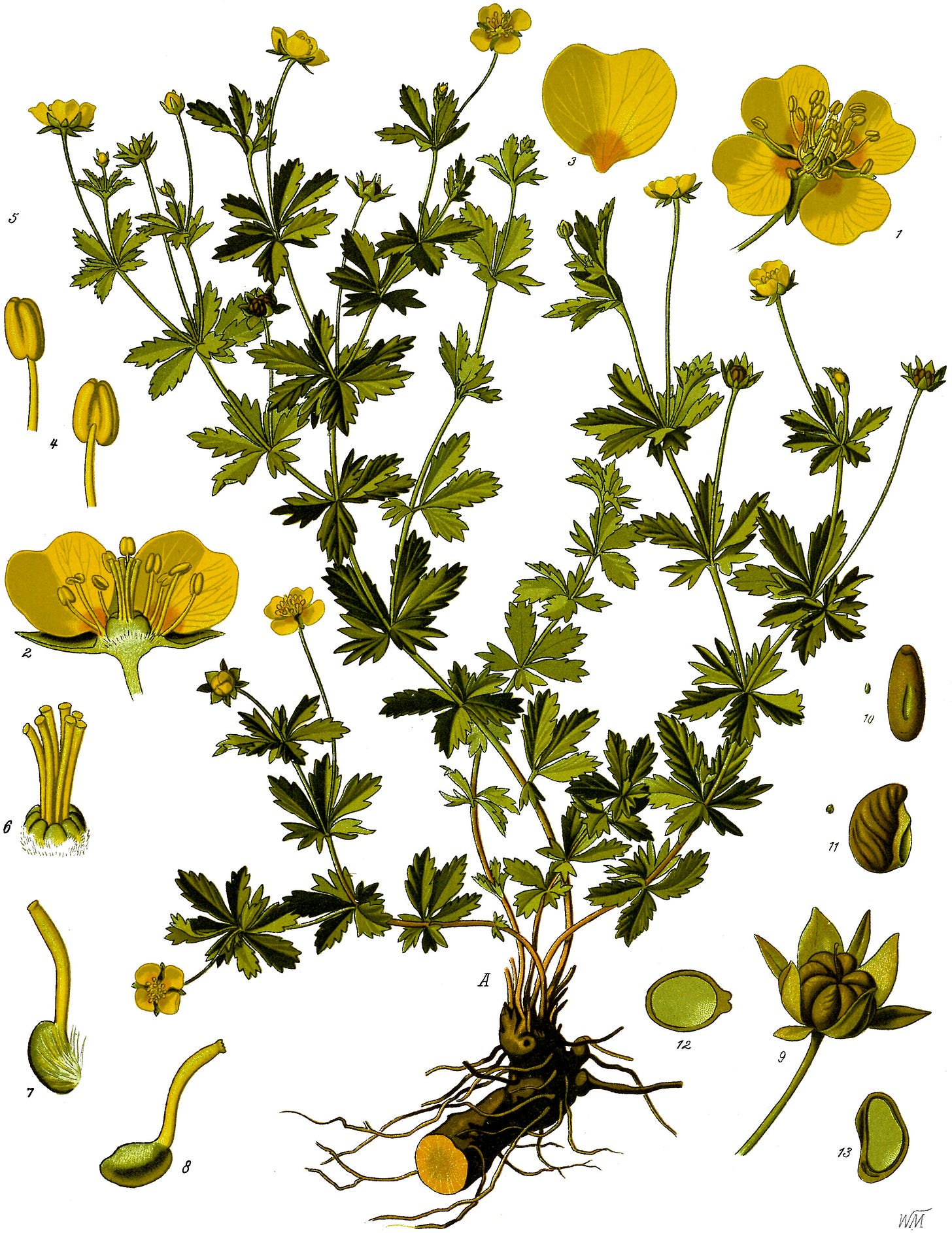
I’ve been chatting a lot to Shane over at Zero Input Agriculture recently, after I discovered that he was trying to breed an alternative, zero input, high yield root crop using Cana for his dry, unpredictable Australian climate.
In fact, this post owes a lot to his knowledge about biology and the time he’s given to chat about it. So go and check out his substack!
He’s inspired me to try and drastically expand the genetic pool of Potentilla anserina by breeding it with others in the Potentilla genus.
Potentilla anserina was actually re-assigned to a new genus called Argentina, so they’re really called Argentina anserina. These are commonly known as the “Silverweeds”. Most potentilla species are not part of this new family. The common name for Potentilla is “cinquefoil”.
Even after splitting up the potentilla genus, it remains one of the biggest collection of species on earth.
Actually, he wanted me to also try breeding it with things in the Rosaceae family (citing the work of famous American plant breeder Luther Burbank who showed that things in this family are able to cross, such as blackberry and apple, but others too). I will confine myself to the Potentilleae tribe of which the genus of Argentina and Potentilla are both members of.
If all this taxonomy is confusing then I refer you to this helpful diagram which I’ve reproduced below. I’m only - for now - proposing crosses within the green box (a lot more genetically alike), not the red box.
.
This type of plant crossing - called intergeneric hybridisation - when you cross two plants that are in separate genera (the plural of genus), but in the same family (in this case Rosaceae) is really interesting I will post about this in a separate entry.
So, my mission is now slightly expanded but to me a lot more exciting.
Let’s recap.
Original mission
Acquire a wide range of P. anserina plants from geographically disperse places
Cross them (naturally or otherwise)
Keep selecting the children with the biggest, fattest and tastiest roots to produce a harvest worthy P. anserina cultivar
Unleash into the world as a sustainable, zero input, carbohydrate plant source
New mission
Acquire as many species in the Potentilla and Argentina genus as possible that have edible roots.
Cross these carefully with P. anserina
Select the children with the biggest, fattest, tastiet roots
Back cross these children with P. Anserina if necessary
Unleash into the world a super vigorous, sustainable, zero input, carbohydrate plant source
So why are we adding some intermediate steps?
Shane’s argument, which I have come to agree with, is that we want the most diverse genetic pool to begin with before we start selecting down. The hope is that I can get to really big roots (carrot sized, hopefully!) without compromosing on any vigorousness or health because the starting pool. If I manage to obtain species from as many different climates as possible then I can really give my genetics pool a leg up. I’m excited by just thinking about crossing an alpine species with a dry adapted one, bringing together two gene pools that have not met for possibly millions of years.
Desired species for crossing
Potentilla erecta
Want, any form
These have the biggest roots I have ever seen on a Potentilla/Argentina species, but the downside being that they have a higher tannin content than oak - one of the reasons they are used medicinally.
I really want the genes that give this large root and I’m prepared to backcross to P. anserina multiple times to achieve this
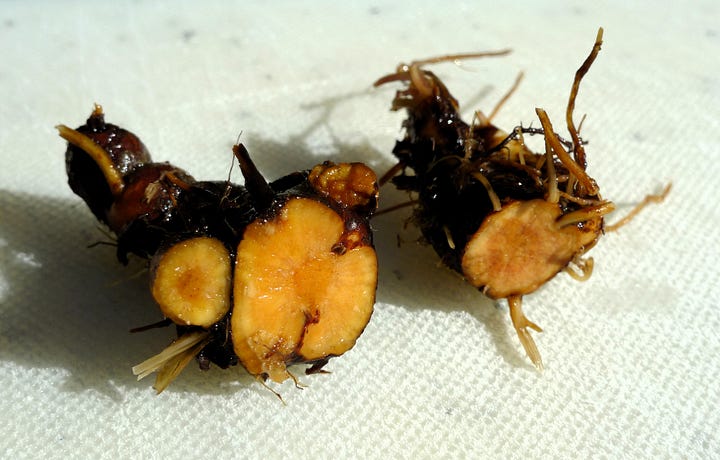
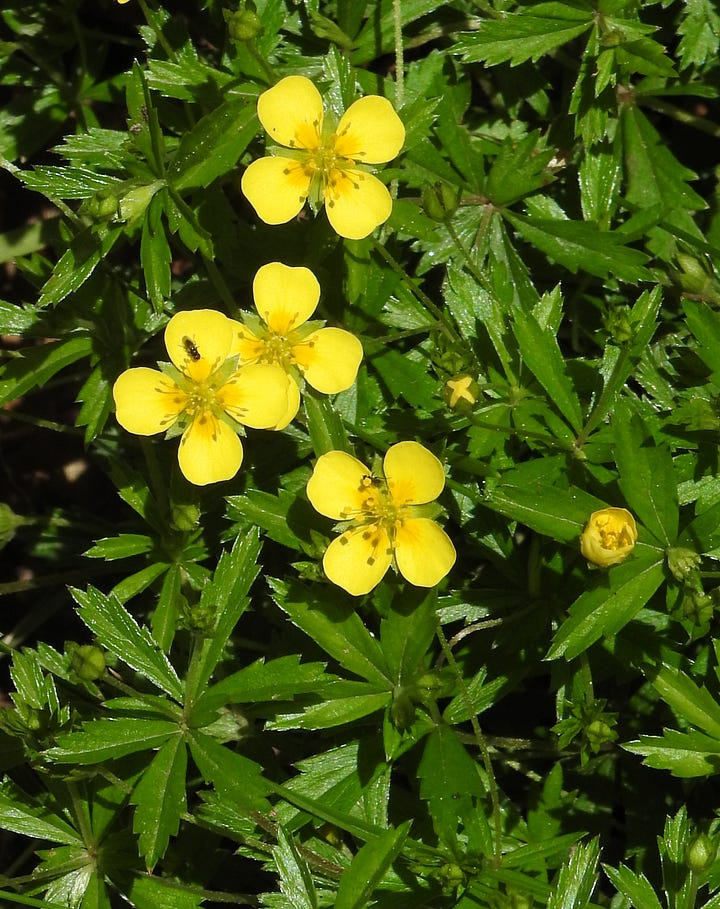
Potentilla nepalensis
Acquired, plug plants
Various second hand sources have shown that these have edible roots (but I can not track down a copy of the primary source).
They have red flowers and I would really like to know what the hybrid would look like.
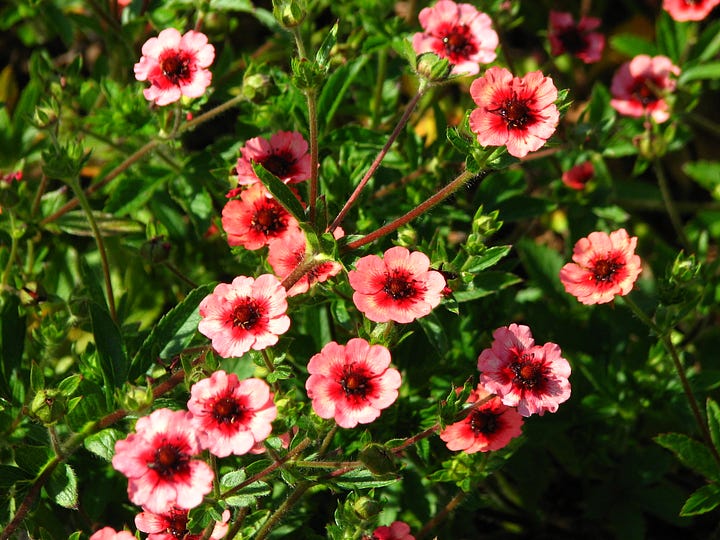
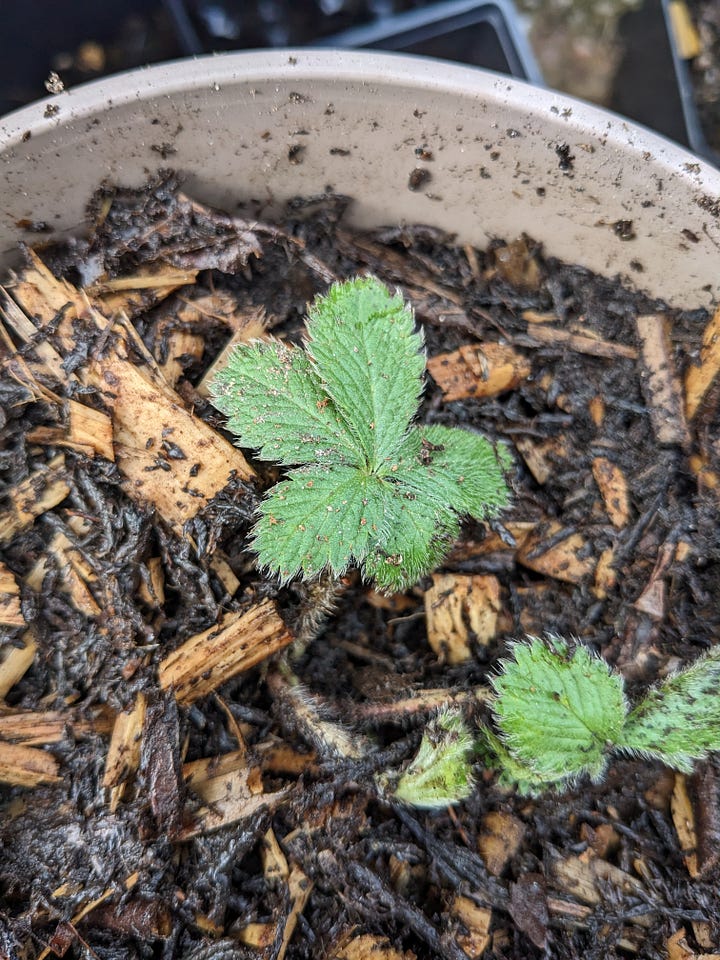
Potentilla crantzii
Acquired, seeds
These survive in Greenland, and other inhospitable cold places. They will be a worthy addition to the genepool.
Germination requirements are somewhat mixed, but if I’m reading this paper correctly, just putting it on the window sill in damp soil should be fine and more importantly easy.
Information on P. crantzii is sparse, but I found one really nice fact file from the Botanical Society of Britain & Ireland.
These plants have an “unbranched woody rootstock” so I need to be mindful of this when I cross them with A. anserina, and will likely need at least one back cross to re-establish edibility.
Additionally, “vegetative spread appears restricted […] and populations usually consist of discrete individuals, presumably established from seed” which means that I may end up with some children that don’t spread like strawberries - one of things that make A. anserina so appealing for sustainabilty.
I will need to be very careful with the genetics of this, and perhaps just breeding it once to insert some really cold hardiness before multiple back crosses to remove the properties that I don’t want.

How you can help
I’ve been previously fortunate to have friends and strangers send me samples of P. anserina from all over the world, and I still wouldn’t turn down new samples.
Now I’m looking a bit more widely, for species of Potentilla or Argentina that I can’t acquire in the UK that have edible roots. My problems are that I don’t have a comprehensive list of all Potentilla/Argentina species with edible roots (I doubt that exists, and if it doesn’t, I’d like to help compile it) and most that I find are not easily acquirable in the UK.
What I am especially interested in right now is dry adapted Potentilla/Argentina species, as I have the other climates mostly covered
So if you know of any Potentilla or Argentina species with edible roots, please do tell. And even better if you can send these samples across to me!






I would like to explain why this project, while interesting, is not truly necessary.
There is no plant that is ideally adapted to all environments, if that was possible in the first place it would have emerged already.
So cross-breeding species that are well adapted to one place with those from another will only produce something that isn't as good as the natives in either.
Secondly, the more carrot like the roots become, the less energy the plant will have to focus on itself. It will also become more prone to pests and disease. They will also sap more resources from the soil, as potatoes do, leading to quality disintegration and excessive competition.
Ultimately it is the same effect that can be seen in farmed cows and pigs. They become useless and difficult to keep alive.
To be sustainable in evolutionary terms, the plant needs to be left alone to develop its defence mechanisms. That will make it harder for people to harvest, but it's not actually that difficult really. It's just that modern people are ridiculously lazy, obsessed with profit and seek unsustainable levels of efficiency that border on the absurd.
The giant fields that currently supply most of the world's agricultural needs are plagued by continuous battle against pests and diseases that can only be held back by non-stop innovations in pesticides and germicides. While the massive resource requirements can only be met with copious amounts of fertiliser. Ordinarily, animals living in the area would provide their fecal matter alongside rotting leaves from trees, bacteria living in the soil, and umderground rivers. But people decided to remove all of that and then import it on massive trucks because they are morons.
In africa, huge swarms of locusts are habitually destroyed by chemicals that have to be swapped out as they become resistant. Elsewhere we have aphid epidemics and corn worm infestations. Cross-resistance is starting to develop in most species and new methods such as genetic extinction have been suggested.
It is only a matter of time really before industrial scale farming becomes completely infeasible. It was always an idiotic idea to grow thousands of identical plants in a grid with no regard for natural predators, disease evolution or soil composition.
So what I think makes more sense is breeding plants that are well adapted to each locality along with insects, animals and birds that can balance the ecosystem without completely destroying the crop. There will be losses, but they can be considered a kind of nature tax.
Hi, I'm glad the silverweed plants made it to you OK. I think I can send you some Potentilla erecta too. This is also a wild flower here and I have plenty on my tree field (https://skyeent.wordpress.com/2019/06/23/in-praise-of-small-flowers/). It doesn't sound that palatable though - pfaf says it's full of tannic acid, so you may have to do a bit of back crossing. It does seem to form a woody mass of roots which are pretty thick. I think I've still got your address somewhere so I'll see what I can do (tomorrow's supposed to be drier).